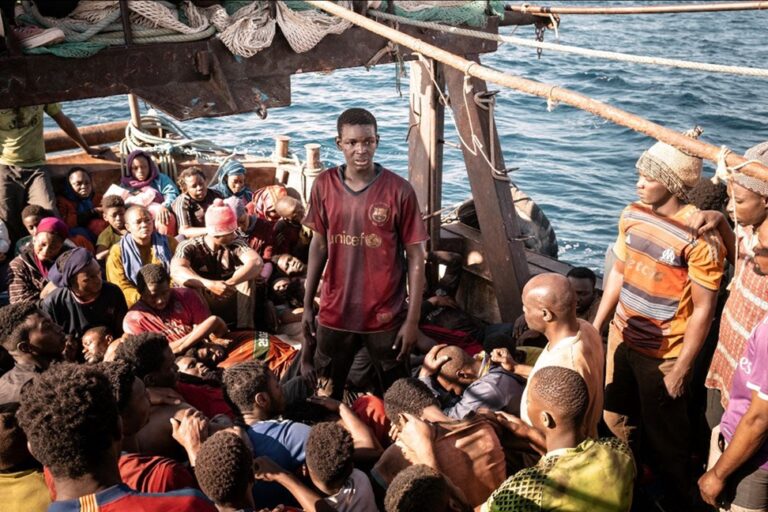
People always want to believe that there’s something better to be found somewhere else. In many cases that’s true, especially in war-torn or impoverished countries where opportunities just don’t exist. Yet the journey to another geographical area is sure not to be simple, and if someone doesn’t have the resources to be comfortable at home, it’s unlikely that they’ll be able to afford safe and reliable passage to wherever they are trying to go. Success also isn’t guaranteed somewhere else, particularly for someone who doesn’t know the language and clearly looks different. Italy’s official Oscar submission, Me Captain, powerfully demonstrates the allure of the unknown and the harrowing trip required to try to get there.
Seydou (Seydou Sarr) and his cousin Moussa (Moustapha Fall) live in Senegal and dream of a better future. Despite the fervent objections of Seydou’s mother, they decide to leave to go to Italy, where they fantasize about a flourishing music career and having white people wait in line to get autographs from them. Their journey begins simply enough but quickly turns sour, as each trafficker demands more money and offers fewer rewards, constantly setting them back as they must determine how much they really want this and whether the arduous and treacherous multi-country voyage is truly worth everything it will take from them.
Me Captain comes from filmmaker Matteo Garrone, best known for his breakthrough feature Gomorrah. This film isn’t quite as gritty or violent in part because it’s told from the perspective of two teenagers, but it does show the horrific and unfeeling nature of opportunists who know that the people they are providing a service to don’t know any better and will give whatever they have for the very poor treatment they offer. One horrifying sequence finds the cousins holding on for dear life as a driver speeds up over rocky terrain and doesn’t bother to turn back when a passenger is brutally ejected onto the desert, left behind for some dark and unknown fate.
In all that darkness, there is a sense of perseverance that rings true throughout as Seydou and Moussa face imprisonment in which Libyan mafia operatives demand phone numbers so that they can have prisoners’ relatives send money or face vicious torture. Seydou remains focused on what he wants to achieve, and puts in tremendous effort to work his way back to some sense of possibility and optimism. The film combines elements of The Swimmers and Slumdog Millionaire, stories or survival and cleverness, for an affirming experience that transcends its miserable setup and ensuing events.
This is hardly the first film about the African migrant crisis, and it’s one that comes at a continuously relevant time in which this is a real-world issue. It serves to humanize the people involved and to see how they give everything they have for a chance at something better, and then are repeatedly taken advantage of and set up for imprisonment and death by the people to whom they have given their life savings. It’s hard to imagine high survival rates for anyone like Seydou or Moussa, and this film doubles as a tribute to the many nameless people who have lost their lives in pursuit of some dream they thought they might be able to achieve.
Key to this film’s effectiveness are its stars. Sarr, a musician who makes his film debut with this performance, is an exceptional find, and some of his best moments in the film involve dream sequences where he imagines himself returning to help someone who has fallen off the path and sees them flying alongside him, as if he is bringing their spirit with him to his next destination. Fall is also terrific, and the two anchor a film that might not always be meant as literal yet stays very focused on where it’s headed and the inescapable nature of its characters’ evolving situation.
Grade: B+
Check out more of Abe Friedtanzer’s articles.
Me Captain makes its North American Premiere in the Luminaries section at AFI Fest 2023.

